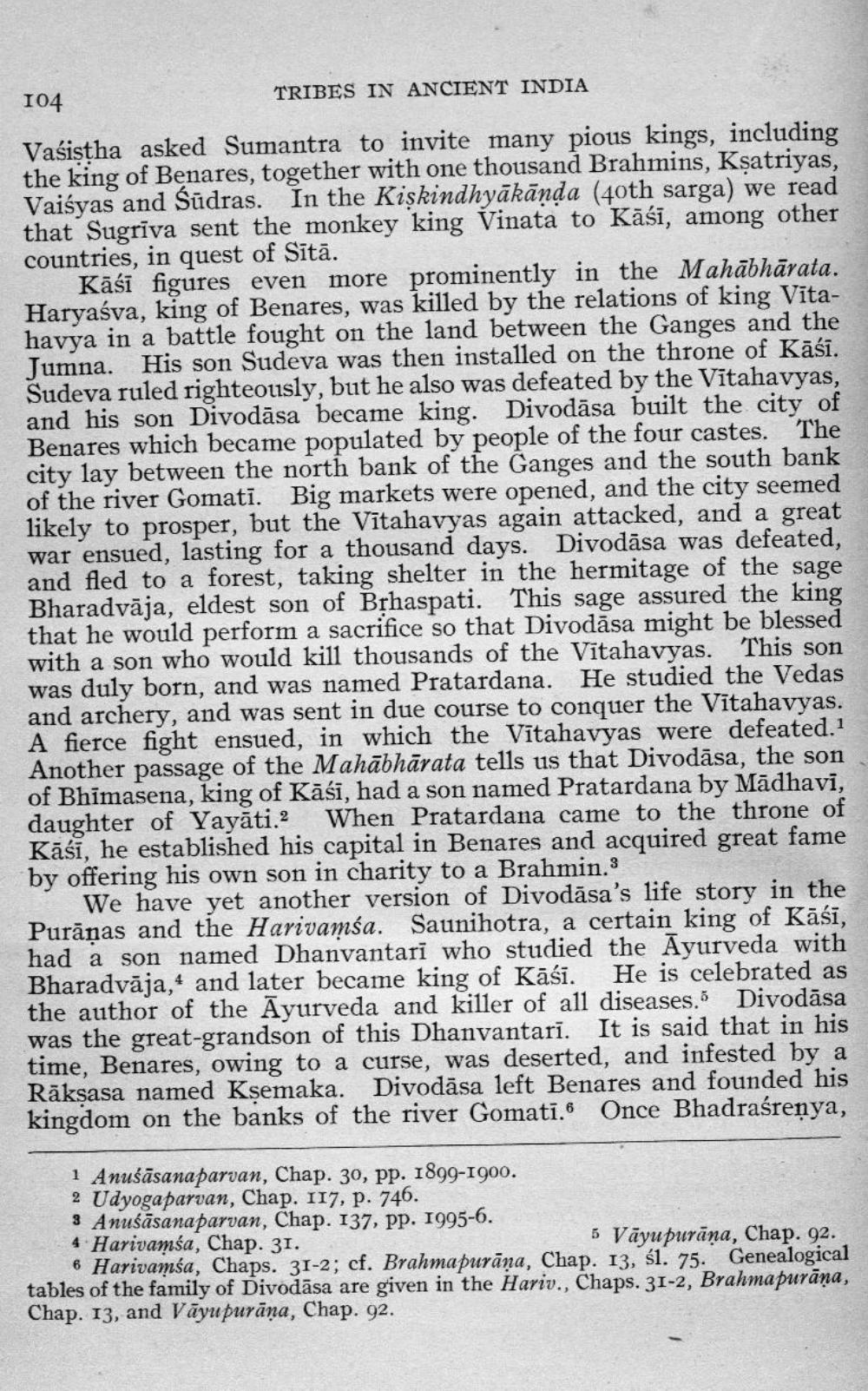________________
104
TRIBES IN ANCIENT INDIA Vaśistha asked Sumantra to invite many pious kings, including the king of Benares, together with one thousand Brahmins, Ksatriyas, Vaiśyas and Sūdras. In the Kiskindhyākānda (40th sarga) we read that Sugrīva sent the monkey king Vinata to Kāśī, among other countries, in quest of Sītā.
Kāśi figures even more prominently in the Mahābhārata. Haryaśva, king of Benares, was killed by the relations of king Vītahavya in a battle fought on the land between the Ganges and the Jumna. His son Sudeva was then installed on the throne of Kāśi. Sudeva ruled righteously, but he also was defeated by the Vītahavyas, and his son Divodāsa became king. Divodāsa built the city of Benares which became populated by people of the four castes. The city lay between the north bank of the Ganges and the south bank of the river Gomati. Big markets were opened, and the city seemed likely to prosper, but the Vītahavyas again attacked, and a great war ensued, lasting for a thousand days. Divodāsa was defeated, and fled to a forest, taking shelter in the hermitage of the sage Bharadvāja, eldest son of Brhaspati. This sage assured the king that he would perform a sacrifice so that Divodāsa might be blessed with a son who would kill thousands of the Vitahavyas. This son was duly born, and was named Pratardana. He studied the Vedas and archery, and was sent in due course to conquer the Vītahavyas. A fierce fight ensued, in which the Vītahavyas were defeated.1 Another passage of the Mahābhārata tells us that Divodāsa, the son of Bhimasena, king of Kāśi, had a son named Pratardana by Madhavi, daughter of Yayāti.2 When Pratardana came to the throne of Kāśi, he established his capital in Benares and acquired great fame by offering his own son in charity to a Brahmin.:
We have yet another version of Divodāsa's life story in the Purāṇas and the Harivamśa. Saunihotra, a certain king of Kāśī, had a son named Dhanvantari who studied the Ayurveda with Bharadvāja. 4 and later became king of Kāśi. He is celebrated as the author of the Ayurveda and killer of all diseases. Divodāsa was the great-grandson of this Dhanvantarī. It is said that in his time, Benares, owing to a curse, was deserted, and infested by a Rāksasa named Ksemaka. Divodāsa left Benares and founded his kingdom on the banks of the river Gomati. Once Bhadraśrenya,
1 Anuśāsana parvan, Chap. 30, pp. 1899-1900. 2 Udyoga parvan, Chap. 117, p. 746. 3 Anuśāsanaparvan, Chap. 137, pp. 1995-6. 4 Harivamśa, Chap. 31.
5 Vāyu purāna, Chap. 92. 6 Harivamsa, Chaps. 31-2; cf. Brahmapurāna, Chap. 13, śl. 75. Genealogical tables of the family of Divodāsa are given in the Hariv., Chaps. 31-2, Brahmapurana, Chap. 13, and Vāyu purāna, Chap. 92.




